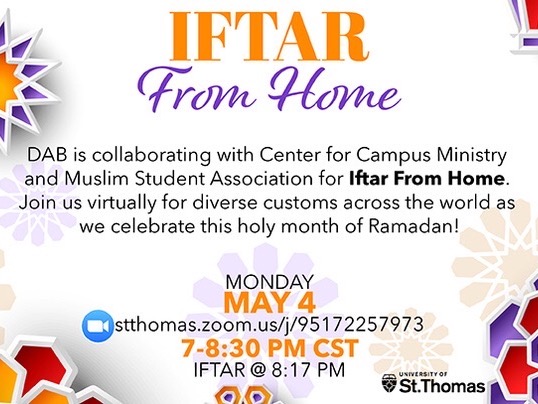
COVID-19 has brought numerous changes to the month of Ramadan. Because of this, the Muslim Student Association, Campus Ministry and the Diversity Activities Board hosted an event called “Iftar from Home,” allowing St. Thomas’ Muslim community to celebrate over Zoom. (Photo courtesy of Aziza Osman)
Muslim students at St. Thomas fast, avoid pleasures and become closer to God during the month of Ramadan, while also celebrating and gathering with families. There will be little gathering this year during the COVID-19 pandemic.
“Ramadan has a big communal aspect to it,” Aziza Osman, junior and Muslim Student Association president, said. “I wouldn’t say necessarily that we’ve given up any traditions, but it’s just different now.”
Ramadan, the ninth month in the Islamic calendar, a lunar calendar based on moon cycles, is the most sacred month of the year in Islamic culture.
“Ramadan is one of the five pillars in Islam,” Campus Ministry Associate Chaplain Sadaf Shier said. “(The five pillars) are like mandatory worship prayers that every Muslim has to do.”
During Ramadan, which lasts 30 days, Muslims fast from sunrise to sunset. They must avoid food, drink, smoking and sexual activities during that time.
“Every Muslim adult who is not sick, pregnant, nursing, traveling, not old and feeble or does not have a menstrual cycle has to fast,” Shier said. “Not fulfilling it is a big sin.”
At sunset each night, Muslims gather for a meal, called Iftar.
“It’s more blessings for you if you do (Iftar) with people, or have people over or feed people,” Osman said. “That’s something that is encouraged.”
The Muslim Student Association, in association with Campus Ministry and the Diversity Activities Board, hosted an event called “Iftar from Home” Monday, May 4 on Zoom. The group gathered virtually and talked about Ramadan and changes that COVID-19 has brought to the annual celebration. During that event, they were able to gather for one important tradition.
“We ended with the Adhan, the call for prayer, at the sunset time,” Osman said. “We did that all together over Zoom.”
Prayers are normally done with community members in mosques. However, stay-at-home orders and the closure of mosques have prevented this.
“Now, we pray at home with family,” Osman said. “It’s just the feeling of being near other community members, the physical-ness is not there.”
Despite not being able to celebrate the month according to tradition, Osman has found a silver lining during this time.
“Now that we’re at home, there’s definitely more time,” Osman said. “People have more availability to increase their spirituality.”
Justin Amaker can be reached at justin.amaker@stthomas.edu.
